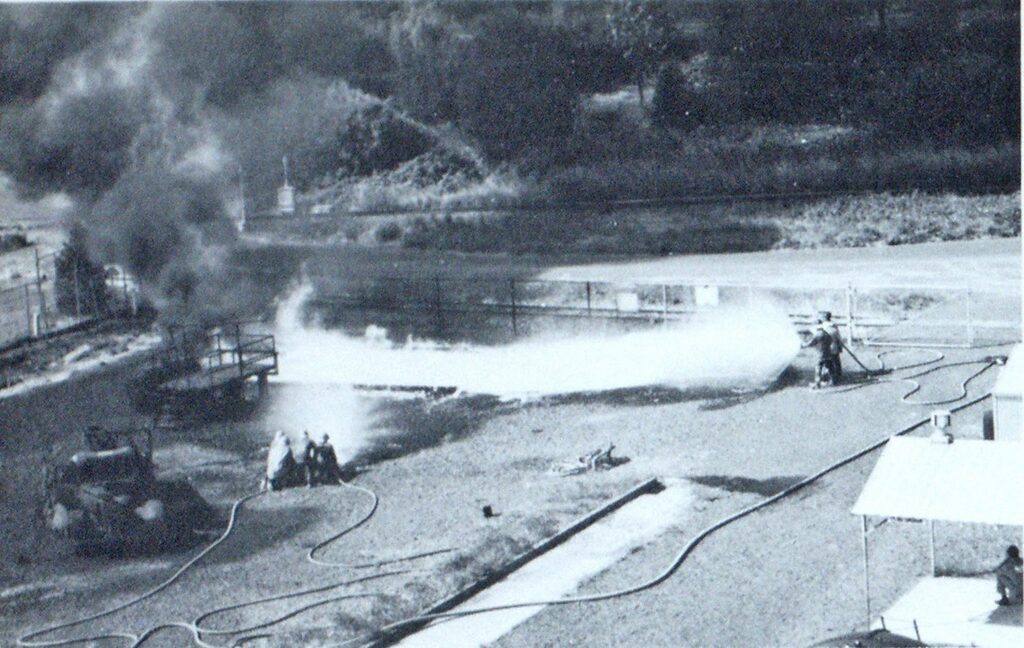
Flammable Liquid and LPG Training Combines Theory with Experience
features


The devasting potential of a major flammable liquid or liquefied petroleum gas fire within the boundaries of a metropolitan community can only be imagined. There is not only the problem of bulk storage yards, but the daily contact with liquefied petroleum gas (LPG) cylinders, gasoline, oil, propane tank trucks, railroad cars and barges. Whenever some catastrophic accident occurs, both private and public fire fighters must know how to deal with the problem quickly and instinctively.
The Portland, Ore., Fire Bureau training center examined the training needed and reassessed its own flammable liquid/LPG fire control training program. It was clear that a glossing over of the general problems inherent in fighting such fires would be insufficient training for both the Portland fire fighters and the many oil company fire fighting agencies in the area.
The Portland Fire Bureau training center, under the direction of Battalion Chief Ken L. Owens, developed an intensive and extensive curriculum, that combined a 12-part instructional phase with a “hands on” experience at Portland’s Linnton oil fire training grounds.
Critical areas for study
The lecture portion of the course was developed around 12 critical topical areas, designed in such a way that students must pass each area individually. The course covers the physical makeup of petroleum products and methods for extinguishing flammable liquid fires; the types of bulk storage containers and the fire protection systems within a bulk plant; the types and problems in the transportation of flammable liquids and gases; how to use fire extinguishers on flammable liquid and LPG fires; and, finally, the tactics employed in single and two-company foam attacks on various types of spills and fires.
Upon successful completion of the lecture portion of the course, the students are introduced to practical exercises in tactics at the Linnton oil fire training grounds. Those successfully completing the course receive a completion certificate and, through a cooperative agreement, may receive three elective credit hours toward an associate of science degree in fire technology at Portland Community College.
The opening of the Linnton oil fire training grounds for practical experience learning was a decision which resulted in a tremendous amount of additional work for the project officer, Captain David A. Norris. In addition to supervising the t raining at the oil fire grounds, Norris is responsible for actively recruiting donated materials for the continuation of the project. To date, Norris, who is noted as an expert “scrounger,” has been exceptionally successful in finding both materials and students.
He says, “We will do all we can to provide flammable liquid/LPG fire control training for everyone in the Portland metropolitan area, as long as we can get the necessary fuel and foam donated.”
Students from many areas
Owens calls the project, “getting more for our burn.” The ongoing program has trained personnel from two naval ships, four major oil companies and several suburban fire departments, in addition to the PBF fire fighters since last December. As an example, in a 30-day period in March and April, 594 Portland fire fighters, 132 suburban fire fighters from three other cities and 70 personnel from four major oil companies underwent the training.
More than 250 men of the U.S.S. Juneau are scheduled for training, and the bureau has a waiting list of public and private fire brigades committed to the training as soon as the necessary foam and fuel are available. Owens and Norris are handling the training requests on a first-come, first-served basis. They are, in the meantime, still in pursuit of donated materials.

